#yeah so beloved mutual who issued me this challenge in the first place and also said that there are fewer jake twirls
Explore tagged Tumblr posts
Text
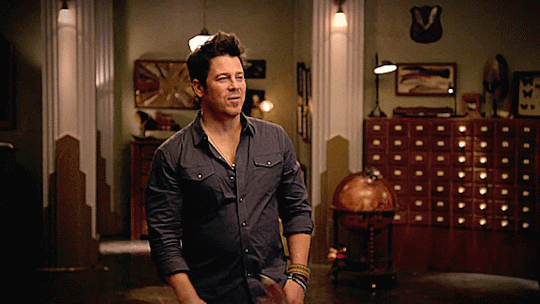
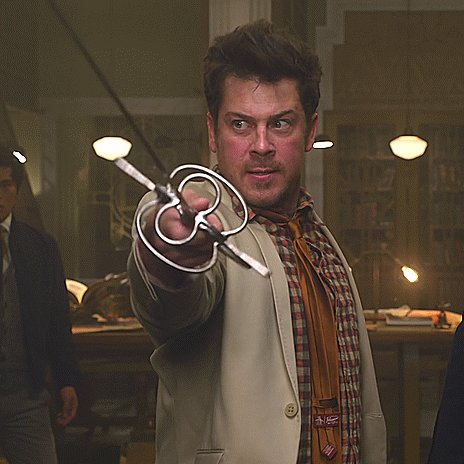



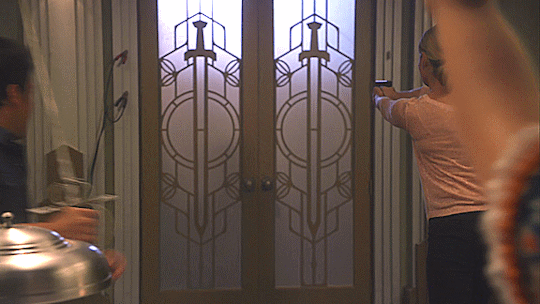


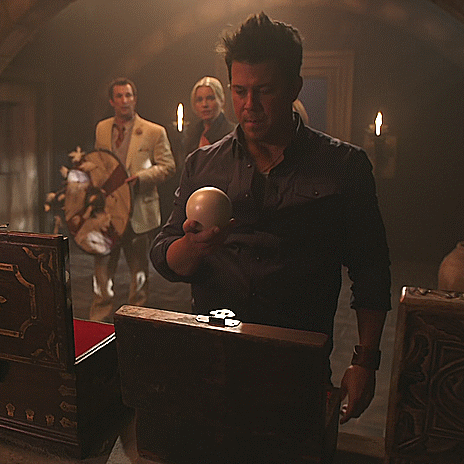


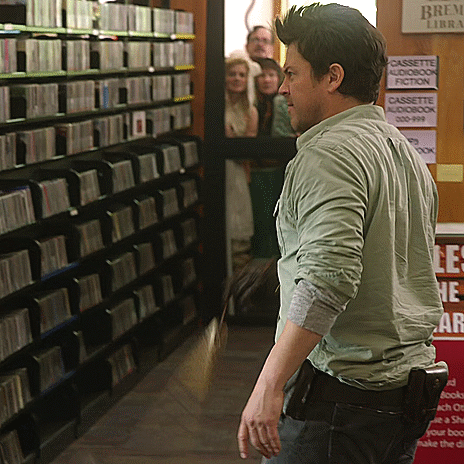


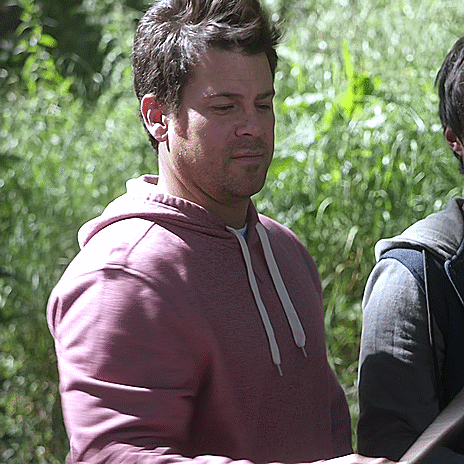

Christian Kane twirling props: a series. Part 9/?
The Librarians Season 1
#christian kane#the librarians#jacob stone#christian kane twirling props: a series#if eliot's thing is knife twirls then jake's is axe twirls#and yeah jake twirls a hell of a lot more than eliot#considering there are 10 episodes and 14 twirls (15 if you count the promo one at the start)#yeah so beloved mutual who issued me this challenge in the first place and also said that there are fewer jake twirls#LIES!#lies i tell you!#(but i still love you anyway)#ghostly'sgifs
355 notes
·
View notes
Text
So Why Should A Hero Be Moral?
The idea of a guy with super powers doing incredible things wasn’t invented by either Japanese anime, western comics, or some obscure 1920′s writer somewhere. No, no, it goes as far back, at least in terms of written record, to Plato’s work known as “Republic”. We find it beginning with the description of an “ancestor of Gyges”. And if you know that name...you know about Gyges’s Ring.
See, this ring makes you invisible if you slip it on. Using the ring, this man got into the king’s palace, seduced the king’s wife, killed the king with her help, and became the new ruler. This story is told to pose a question to us. “Do people actually love justice and goodness for its own sake, or do they do it because they realize if they’re unjust, there’ll be consequences for their actions?
Glaucon, the narrator, takes an “Immoralist” viewpoint. If ANY such person had that kinda magic ring, they’d behave in the same way. NOBODY would “refrain his hands from the possession of others and not touch them”. Well, this is quite the question. Would you do that? Should you do that? But it goes further. Glaucon also claims that if there were any people with special powers so committed to doing good that they’d still seek to be just, the rest of us would despise them and regard them with contempt. Why? Because if anyone who had a license to do whatever the hell they thought refused to do wrong or lay their hands on others things, the reaction would be “What the hell are you, stupid? You moron! You can do f--king anything and you’re not doing it?”
So Glaucon challenges Socrates in “Republic”. If you want to make a really convincing argument for why people should seek to BE good and not just APPEAR good, well, then show that the life of a person who is truly just but thought by others not to be so is superior to the life of someone who is ACTUALLY unjust, but has a good reputation. We have to compare the lives of people who are genuinely good vs the people who pretend to be so, but are thought of, outwardly, as good.
This is quite the challenge. So then...why SHOULD someone with superpowers or powers of any kind be good at all? Why should people, in general, be good? Not just appear good...BE good? Well, Plato presented a person, in Republic, as being someone who was thought of as unjust and suffered accordingly despite being good...and that person maaaaay have come from personal experience. After all, his beloved teacher was Socrates, a wise, brilliant and formerly well-known and cherished philosopher...who people turned on thanks to trumped up legal charges by claiming he was “corrupting the youth” and other BS claims. So a real, genuine, actual good person DID get thought of as being a stupid ignorant fool and let’s all boo and hiss him and then execute him via the state.
But we’re not in Ancient Greece, so let’s try to call on someone a LITTLE more modern. Kierkegaard the German Philosopher! He said that humans are called upon in life to, well, live a live of universal love. We are called by God to love our neighbors as ourselves, and nobody really falls outside that category of “neighbor”. It’s kinda like the idea of “We’re all brothers in Christ”.
OBVIOUSLY this isn’t even close to being an easy task, Kierkegaard says we need to overcome natural selfishness, and the inertia that pushes us toward the satisfaction of our own desires when those desires conflict with the good of others. This is the “first danger”. The first obstacle to goodness, justice and love. If you CAN overcome this, you can then face the external issue...a “double danger”. What is that?
Kierkegaard says that the big struggle involves first the person’s inner being struggling with themselves, then with the world outside. Because we don’t live in a world where it’s easy to love one another and to be just, after all.
So a moral person has to engage in a certain amount of self-denial. Only THEN can you overcome the firm pull of selfish desire. But then we have to contend with the world because the world isn’t gonna be so nice to us. We may admire sainthood from a distance but facing real, actual virtue can be...disturbing to folks. Think of, say, figures like Gandhi or Dr. King or Harvey Milk or Nelson Mandela. Oh sure, people may ADORE them now but at the time they were alive, folks severely hated them in a lot of places. They were controversial figures who incurred a lot of criticism and in many cases for many beloved figures today...they got murdered for their efforts.
And the temptation of double danger and the like isn’t necessarily the temptation to be a supervillain. Take Spider-Man. Peter’s on his way to see MJ perform. He promised he’d see her. But...uh oh. Some guys are robbing an unfortunate in an alleyway. And...well, he’s Spider-Man! He’s got to help them! So he ends up missing her performance because he had to save people. This wasn’t a temptation to use his powers for financial gain or anything. It was a choice between using your powers for good or...well, just having a normal, private kinda life. He’s tempted to be ORDINARY, not evil. A lot of us kind of experience this. Most of us aren’t tempted to be villains. We wanna be free to pursue our own individual happiness is all.
However Peter also experiences the second danger because J Jonah Jameson, head of the biggest paper in the city, is ALWAYS shouting how Spidey is a menace. Menace! MENACE! Despite Spider-Man saving his life multiple times, AND his son, AND NYC, AND the World over and over...
But no. MENACE!
The good news is the average NYC person doesn’t seem to fear Spider-Man. Unless Joe f--kin’ Quesada is writing the story or the episode because yeah, THAT isn’t tired and played out. But such a thing is a good example of the double danger. Either they cynically refuse to believe in his goodness...or they call him a chump behind his back. Just as Glaucon said they would.
But what does Plato say in response? Well, Plato says that in the long run we’ll be happier both in life and in death, if we live in accordance with justice by turning our attention to the good. Morality reflects the true, deep character of the universe. Those who are committed to the good are committed to what is profoundly and eternally true. It’s no accident this viewpoint’s seen as religious, writers from St. Augustine to C.S Lewis have viewed his metaphysical version of the world as very much congruent to their own faith.
It’s also a matter of mutual responsibilities. Tobe a parent or a son or daughter or husband or wife or a citizen of a state means you have duties to the other. Certain obligations are just part of those kinds of relationships. It doesn’t just merely become grounds to love doing good but to enforce morality across wider stretches and turn it into duty.
For example, driving at a moderate speed is a good thing to do, but we also further enforce this as a legal obligation with speed limits. We don’t just have a moral duty to do the right thing, but a legal one at that. And that’s before we get into any kind of open religious reason for being good. Ultimately, Kierkegaard makes the argument, much like Plato, that humans have a simple reason to behave good. Because our own deepest and ultimate happiness is found by following the path of neighbor love.
But of course, now we get to an opposing viewpoint that has sprung up a lot. The concern of UTILITARIANISM. Let me paint a picture for you of a comic featuring Batman. The Joker is on trial for poisoning stamps. People lick them and they die. This time...the Joker’s found guilty and is going to death row. He is, in fact, going to DIE. And nobody could really argue that he doesn’t deserve it. Even though I’m almost completely against the death penalty...
It’s the goddamn JOKER. There are SOME exceptions to the rule. Some people who, absolutely, one hundred percent, would be too, TOO dangerous to let live and whom everyone else in the world would be better off if they were dead, who’ve proven, even if they were unarmed and had nothing but a glass of water...would smash that glass of water, cut the throats of everyone around them and then grab your gun and shoot you.
But...here’s the thing. THIS time...the Joker’s innocent. Batman knows he didn’t do it.
So...what should he do? A lot of us, and I’m tempted myself, would say, well, “Let the motherf--ker fry in the chair”.
Let’s think up another possibility. The Green Goblin has lasso’d an irritated dishwasher. He’s soaring on his Goblin Glider, the poor guy being dragged behind him, screaming all the way, he gets broken ribs and everything. Luckily, Spider-Man saves him. Now, what nobody knows is the guy was a disgrunted employee who had a gun in his pocket. He was gonna unload it into the first asshole in the diner he worked at because he was sick and tired of being underpaid by a cruel boss, picked on at work, and he just one day has decided he’s had enough. With what he WENT through now though, he gives up on his plan, destroys his gun, and signs up for an anger management course.
So was what the Green Goblin did the right thing? Well, a UTILITARIAN would argue yes, it was. But surely that’s not correct, dragging a rando around Fifth and Main with the intention of traumatizing the guy and maybe even killing him just to use him as bait for his nemesis is CLEARLY an evil act, even if it UNINTENTIONALLY produces a greater good.
So who do we turn to now? Let’s try Immanuel Kant. Kant maintained our fundamental duty is to act in a way that satisfies what’s called the “categorical imperative”. A formulation that states we should ALWAYS treat people as an ends in themselves, not MERELY as means. This comes down to treating people as always having intrinsic value, and never just using them for our own purposes as if they just had INSTRUMENTAL value. But remember, performing an action in accordance with the categorical imperative alone isn’t enough to make it good. You have to do it because it is your duty to do it! If an action treats an individual as an ends in and of themselves and the person performs the action regarding such individuals in way that indicates they’re following their duty of treating people appropriately, then their action is good. So treat others first as people, not as means to an end, and do it for the right reasons, not for selfish ones. It’s your duty to yourself, to others in Kant’s eyes.
So what are these “duties” though? Now we get into the weeds. There’s positive and negative duties. Positive is stuff like tending to the sick. Feeding and clothing the poor. Negative duties are obligations to REFRAIN from doing things that harm people, like assaulting an innocent person or maliciously lying to them. By doing our positive duties, we treat people as ends in and of themselves by showing them respect, and we’re fulfilling our negative duties by avoid treating them as merely a means.
Spider-Man dives into this sort of thinking a lot. It’s classic line “with great power comes great responsibility” is an admonishment for people to be careful with the powers they have. Those who have power have a duty and an obligation to help those in need. Boiled down simply, its answering the question of “But why be moral at all?” For one, if you fail to do your duty, there will be negative consequences that affect you, directly or indirectly. But then again, this can be questionable. Sometimes reason one isn’t convincing in a world where evil can easily bring profit and virtue none at all. So what’s the second reason?
Because it’s right.
People like Kant and FH. Bradley, another philosopher, have brought this up. Appealing to someone’s self-interest in the name of getting them to do a moral duty is basically missing the point. Them doing it for pragmatic or selfish reasons means they’re not behaving morally at all. You have to do the right thing BECAUSE it’s right. Not for some self-interested reward. But what if we’re given very strong reasons to do the wrong thing? Then doing the right thing would be irrational. So we have to make sure we’re not being irrational in doing the right thing.
So if reason one and reason two don’t work...is there a third reason? Well, yes. Let’s go back to Plato. Plato says “It’s the only way you’ll really have piece of mind”. According to Plato, a person’s soul consists of reason, of appetites, and the “spirited element”. Reason includes the conscience, and reason MUST govern the soul or the soul is discordant, lacking in harmony. But there’s plenty of people who don’t approach life from a dominantly moral perspective, so does this idea work? After all, even many morally upright people face temptation at some point, or give in occasionally.
Artistole had another answer. Virtue is its own reward. Being moral is a greater benefit to you than any benefit you might obtain at the expense of your good moral character. Unfortunately that doesn’t seem necessarily true,, the rewards of perfect virtue do not always compensate compared to the rewards for wrongdoing. So then what’s next?
Reason five! Doing good pays off in the long run. Now, if you’re a religious person, you may already know about this answer. It’s very similar to reason one. But we don’t have to accept it. It calls for some strong metaphysical positions about the nature of reality.
But then again, maybe it’s not a singular answer that IS the answer. Maybe the multitude of reasons given here are good enough. Maybe it’s a little of them all that explains WHY heroes should behave in a moral way. Why people should be moral and good. Ultimately, how you choose to answer the question”Why be moral”...that’s up to you, and hopefully, you can be proud of the answer you give.
8 notes
·
View notes
Text
Stargazing Zine Contributor Spotlight
Get to know the contributors that are a part of Stargazing: a Sheith AU Fanzine! Next up is @amorremanet, who did a roleswap AU fic!
A special thank you to Andromeda Zine for allowing us to borrow this concept!
Amorremanet
“Keith says, ‘Nothing is worth Shiro’s pain.’ I say, ‘Yeah okay, honey, you can take care of him when I’m done’”
Amorremanet on AO3 @amorremanet on Tumblr
Your piece for Stargazing has Shiro and Keith with their roles reversed: Keith on the Kerberos mission and Shiro as the half-Galra Garrison washout. Without giving away too much beyond what has been shared in previews already, can you give us some insight into the inspiration behind this AU, and how you picture it changing up the events and interactions of canon?
Role-reversal AUs are a favorite trope of mine. All AUs offer the opportunity to explore pieces of the characters that might not come out as easily in more canon-adjacent fics. What I love about role-swap AUs, though, is the creative challenge of exploring how the “cores” of the different characters can both change and not when they’re literally placed into another canon character’s shoes. As for how the swap in “The Oncoming Storm” changes things, the Galra reveal would also go very differently, because Champion!Keith would fight Allura harder in defense of Shiro than canon!Keith does in defense of himself. But most of the changes that I see coming in this AU are subtler at first, and end up having some cumulatively huge effects. For instance, I think Shiro would still be the Black Paladin at first, while Keith would still be in Red. But that changes the eventual build-up to the Galra reveal: Shiro can’t fight Zarkon head-on and hear the, “You fight like a Galra” line, as canon!Keith did; he would have been ejected by the Black Lion. That line is easy enough to transfer onto Sendak during their fight in “The Fall of the Castle of Lions,” because it’s something that he’d say (and with Sendak, he’d probably mean it as a compliment). But the significance of that fight changes if Shiro is running into a fight with someone who has such a huge advantage because Sendak hurt Keith, Shiro’s beloved. This changes Shiro’s astral plane confrontation with Zarkon, and it all adds up to a very different Galra reveal. The worst part of it for Shiro, though, would be feeling responsible for Keith’s trauma. He blames himself for “pushing” Keith onto the Kerberos mission, but for him to be a member of the species that harmed Keith? In canon, Shiro doesn’t blame Keith and loves him fiercely. But sadly, Shiro wouldn’t show himself that same understanding. So, yeah. A mix of obviously big changes, and little ones that add up to big ones.
I was going to ask you about your favorite minor character in Voltron, but given the contents of this fic, it's not exactly hard to guess! Tell us a little bit about why you chose Iverson as a major character in this fic, and how you went about developing his character.
A: In fairness, I love a lot of the minor characters! That said, I do have an Iverson bias, and I feel like he gets a raw deal. He can be abrasive. His first scene is him chewing the Garrison Trio out. While doing so, he says things about Keith and Shiro that can sound pretty negative. This makes it easy to write Iverson off as a jerk, even a villain. That reading of him doesn’t hold up for me, though. There are several reasons why not, but his relationship with and treatment of Shiro are the most telling, for me. He doesn’t blame Shiro while talking about the Kerberos mission. Iverson doesn’t mention Shiro at all, which is strange when he’s so direct about everything else. Then, when Shiro crashes, Iverson is present in the med-tent for unexplained reasons (which could be personal). When speaking to him, Iverson uses the name, “Shiro.” This isn’t a super-intimate nickname (Lance uses it despite not knowing Shiro personally before Team Voltron). But if Iverson were sticking to protocol, he’d call Shiro, “Lt. Shirogane” (or similar). Before anything else, Iverson tries to reassure Shiro that he’s safe. He only makes the call to put Shiro under because they don’t know what his prosthetic arm can do or not (which is a fair concern). The way Iverson talks about this sounds regretful, too. He doesn’t like drugging Shiro, but his options are limited. That’s how I see Iverson in general. He’s in some difficult places, facing dangerous and high-stakes situations. He isn’t a monster; he’s just a man who’s trying his best with very limited choices and seemingly insurmountable odds. Which is how I tried to portray him in this AU, too, Also, I have a Shiro bias, and canon!Shiro doesn’t have very many non-Keith personal connections before Team Voltron. The way Iverson treats him makes me think Iverson might have been one of them. And I liked exploring that possibility in this fic.
After reading that, definitely consider me a convert. It's always fascinating to see different trends and countertrends in fandom. Related to that, you've mentioned that you've been indulging in fandom between frantic work on your thesis, which is… also about fandom? What's the premise there, and and how are you bringing your own experiences as a fan into your academic work?
A: My MA thesis is about fandom, yes! It’s been through a few different versions before ending up where it is. First, it was going to be a more traditional academic paper, focused about how fans write about LGBTQ experiences and issues in fics/headcanons, and focused on trans and/or non-binary representation in particular. (I worked on this version in 2013-14, so there were even fewer trans fics/hc’s than there are now. Also, the main fandoms in it were Supernatural and Teen Wolf, not VLD.) But my school’s program in women’s/gender studies has three options for the final project: the thesis; the practicum (basically, an internship where you write a paper at the end); and the creative project (which still has a research component, but isn’t). In a required class, our prof had us list ideas for how we could pursue our interests in all three of these options. The creative project that I came up with was, “I mean, I write fanfiction? I guess I could do that.” I expected my prof to tell me how ridiculous this sounded. Instead, she got excited about that idea, which got me excited. Which got my poor advisor excited (especially because my original fic ideas were for HP, which is her pet fandom). Then, everything got derailed by IRL drama for a while. But now, I’ve written my fic (“But boys spring infernal,” my overgrown monster of mutual pining Sheith) and I’m finishing the paper about it. In general, the project is about the LGBTQ and feminist potential of fanfic, with a focus on hurt/comfort and AUs, which are sadly under-researched. Aside from canon-divergence fics, AUs especially get a raw deal. Most fan studies scholars write them off as original fic with fandom characters pasted on. That bugs me both as a fan who loves AUs, and as someone who sees the field of fan studies stagnating because we aren’t adapting as fandom evolves. So, I’m bringing my fannish experiences into my project because they are the project (or a pretty big part of it). In addition to the research that went into this, there’s an autoethnographic element to the paper. I have to write about the process of writing BBSI, as well as the different personal experiences that went into the fic, and it’s been fun but incredibly challenging. On the other hand, I got to cite Legit Sources™ like Michel Foucault while justifying my love of long-haired Shiro. That’s probably my personal peak of questionable academic arguments, and I probably shouldn’t be so proud of it? But I am.
Long-haired Shiro, the Shiro we all deserve. Also, I am totally jealous that you've gotten to write fanfic for a school project. Final question! After reading your piece, I think I ascended to another plane of existence. I absolutely loved it. So I have to ask for your blessing: may I have your fic's hand in marriage?
Oh my god, fgkdhf, thank you! For that compliment, for letting me babble about this fic, and for giving me the chance to write for this zine. As much as I love this role-swap AU idea, “The Oncoming Storm” might not have gotten to exist without Stargazing giving me the push to actually write it. (Which I could write another long answer about, because I find the different levels of communal writing/collaboration that go on in fanfic so fascinating.) With that said? You absolutely have my blessing to marry this fic. I’m so glad that you’re so excited about it, and I’m excited about getting to read everyone else’s fics and see the art pieces when the zine comes out! <333
You can pick up your own copy of Stargazing here! All profits will go to the Center for Victims of Torture.
11 notes
·
View notes